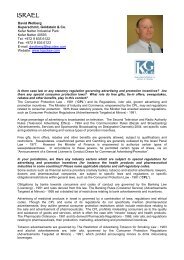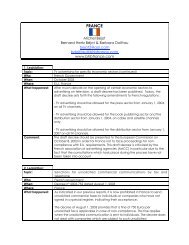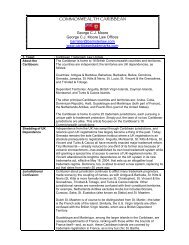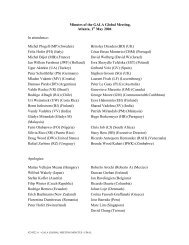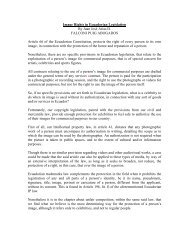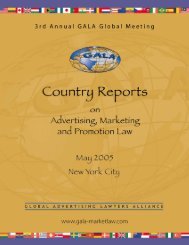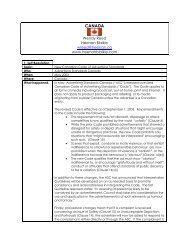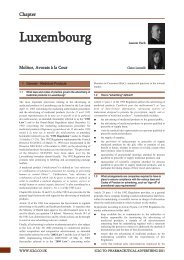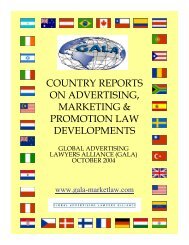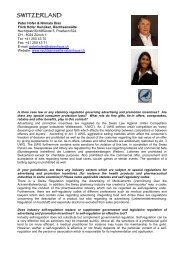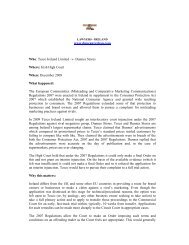International Advertising Clearance - May 2004 - GALA
International Advertising Clearance - May 2004 - GALA
International Advertising Clearance - May 2004 - GALA
Create successful ePaper yourself
Turn your PDF publications into a flip-book with our unique Google optimized e-Paper software.
Television: Yes No<br />
Radio Yes No<br />
Internet Yes No<br />
Print Yes No<br />
Outdoor Yes No<br />
A: Tobacco<br />
Q: What is your country’s law on privacy and/or rights of publicity regarding the use of famous<br />
people in advertising without their express permission?<br />
A: Use of a famous person’s image or name in an advertisement without their<br />
permission is generally unlawful and could amount to false and/or misleading and<br />
deceptive conduct in breach of sections 52 and 53 of the TPA (and the<br />
corresponding provisions of the various FTAs) as well as possibly a “passing off” at<br />
common law.<br />
Q: What is your country’s law on the use of other people’s products in advertising without the<br />
product owner’s permission? For instance, if a mustard company used a very recognizable<br />
automobile as part of its advertisement, would the automobile company have a right of action<br />
against the mustard company for false affiliation or false endorsement?<br />
A: Yes No<br />
Such an action is possible under sections 52 and 53 of the TPA where the use of<br />
the other product in the advertisement is such that consumers are likely to be<br />
misled or deceived into thinking that there is an association between the two<br />
products or their owners when no such association exists. The unauthorised use of<br />
the other product in the advertisement could also amount to a common law<br />
“passing off” where the use is such that people are confused or deceived into<br />
thinking the two products (or the products’ owners) are connected when they<br />
are not.<br />
Q: Are there any restrictions or regulations with respect to price advertising?<br />
A: Yes, section 53(e) of the TPA makes it an offence to make a misleading<br />
representation concerning the “price” of goods or services. In addition, section<br />
53C of the TPA states that an advertiser must state the full cash price for the<br />
goods or services advertised. For example, a mobile phone dealer cannot simply<br />
advertise the cost of a mobile phone when it is sold as part of a service contract.<br />
The company must also specify the full price of the service contract.<br />
Q: Are there any laws, restrictions or regulations which are particular to the culture of your<br />
country which affect advertising, e.g. Swedish gender equality law?<br />
A: Yes No<br />
Q: Are there any cultural norms that should be considered when preparing advertising to be<br />
disseminated in your country (e.g. a strong religious or ethnic presence that might affect the<br />
appropriateness of certain creative material or advertising messages)?



